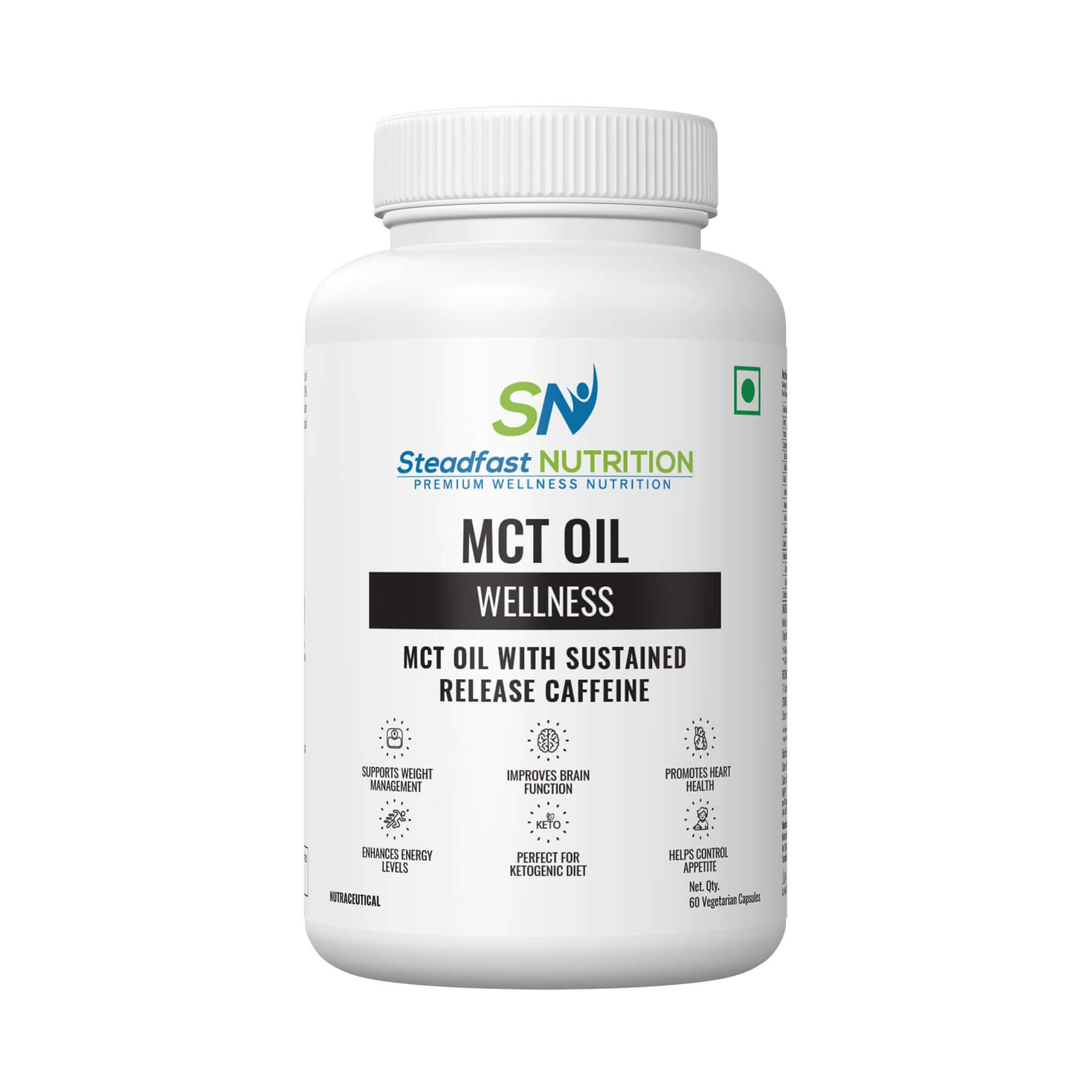All fats are not equal in the world of nutrition. Some are considered healthier than others- MCTs are medium chain triglycerides, healthy saturated fatty acids classified according to the number of carbon atoms in a triglyceride chain- C6: caproic acid, C8:caprylic acid, C10: Capric acid, C12: Lauric acid. If the chain is long, the body finds it hard to metabolise the fatty acid into ATP— the energy currency of the cells. Since MCTs are shorter than longer chain fatty acids, they are the preferred energy sources when using fat for energy.
MCT oil is metabolised, absorbed, and utilised by the body differently than long-chain triglycerides (LCTs), which are digested with the help of bile and pancreatic enzymes in the stomach, absorbed from the digestive system, circulated to the lymphatic system, and transported to the liver. On the other hand, MCTs undergo a far more effective metabolising procedure- they are carried directly to the liver without bile or pancreatic enzymes to break them down and provide energy. Hence, MCTs are more likely to be used as an instant energy source and less likely to be stored as body fat- MCT oil consumption may help shorten the time it takes to reach ketosis compared to LCTs.
Origin
The first time MCTs were used for health purpose was in the 1920s when doctors first suggested the ketogenic (high fat, low carb) diet as a strategy to treat epilepsy in children- the keto diet alters the source through which the brain obtains energy to function.
As the popularity of the keto diet increased, it became more widely accepted- MCT Oil rapidly appeared in health food stores and internet marketplaces.
Difference between MCT Oil and Coconut oil
MCT oil differs from coconut oil. Both have varied benefits.
The richest natural source of MCTs is coconut oil. However, MCTs account for roughly 54% of coconut oil’s total fat composition. Coconut oil comprises MCTs such caprylic, capric, and lauric acid and some LCTs like unsaturated fats. However, the lauric acid in coconut oil is not a good choice for individuals looking to benefit from MCTs because it digests and absorbs more slowly than other MCTs.
Although MCT oil is usually derived from coconut oil, it contains a higher percentage of quickly absorbing caprylic acid, making it a pure source of 100% MCTs.
Benefits
1. Helps in Weight Loss:
MCT oil increases satiety, preventing snacking and overeating that can result in weight gain. Research suggests MCT oil may encourage the production of hormones that indicate your gut is full, suppressing appetite- the 2014 study by M P Mayrsohn, B O'Keeffe, M Kissileff, HR Choudhury, and Laferrère found a link between MCT oil use and reduced food consumption though it was emphasised that additional research was required. A 2015 study by Mumme K and Stonehouse suggested MCT oil may help people lose weight.
2. Provide quick energy:
The body absorbs MCTs more quickly than long-chain triglycerides (LCTs)- they move from the gut to the liver (which breaks them down to fuel) more quickly because of their shorter chains and don't need bile to break them down, making them a quick energy source. MCTs can be turned by the liver into ketones if you're following a ketogenic diet. These ketones can cross the blood-brain barrier, supplying brain cells with energy.
3. Reduce risk factors for cardiac diseases:
MCT oil may help lower Low-Density Cholesterol or “bad fat” levels by improving HDL levels. They can help reduce the inflammation-causing elevated C-reactive protein levels associated with the risk of heart disease.
5. Improve digestion and nutrient absorption:
MCT oil and coconut oil are both helpful for balancing the bacteria in the gut microbiota, improving digestive health, energy expenditure, and the capacity to absorb vitamins and minerals from meals.
Medium-chain fats can help destroy a variety of pathogenic viruses, bacteria, and strains that cause digestive problems, such as constipation, diarrhoea, food poisoning, and stomach aches.
Fatty acids are necessary to absorb fat, soluble vitamins and minerals, including vitamin E, calcium, magnesium, phosphorus, and lutein, and beta-carotene (a precursor to vitamin A found in plants like berries, squash, and leafy greens).
6. Manages Alzheimer’s and epilepsy:
Studies suggest MCT oil may help reduce issues with thinking and memory and benefit individuals with Alzheimer’s disease, which impairs the brain's ability to utilise glucose. Specialists believe using ketones as an alternate energy source may boost brain health. A ketogenic diet containing MCTs provides ketones as an alternative energy source, which could improve brain cell survival. The diet inhibits a brain receptor that contributes to memory loss.
The symptoms of mild to severe Alzheimer's disease may be slightly improved by taking 20 to 70 grams of MCTs that contain caprylic or capric acid.
MCT oil has some positive effects on Alzheimer's disease, but more extensive research is required.
MTCs can be metabolised into ketones, which makes them potentially useful for treating epilepsy.


 Buy Now
Buy Now